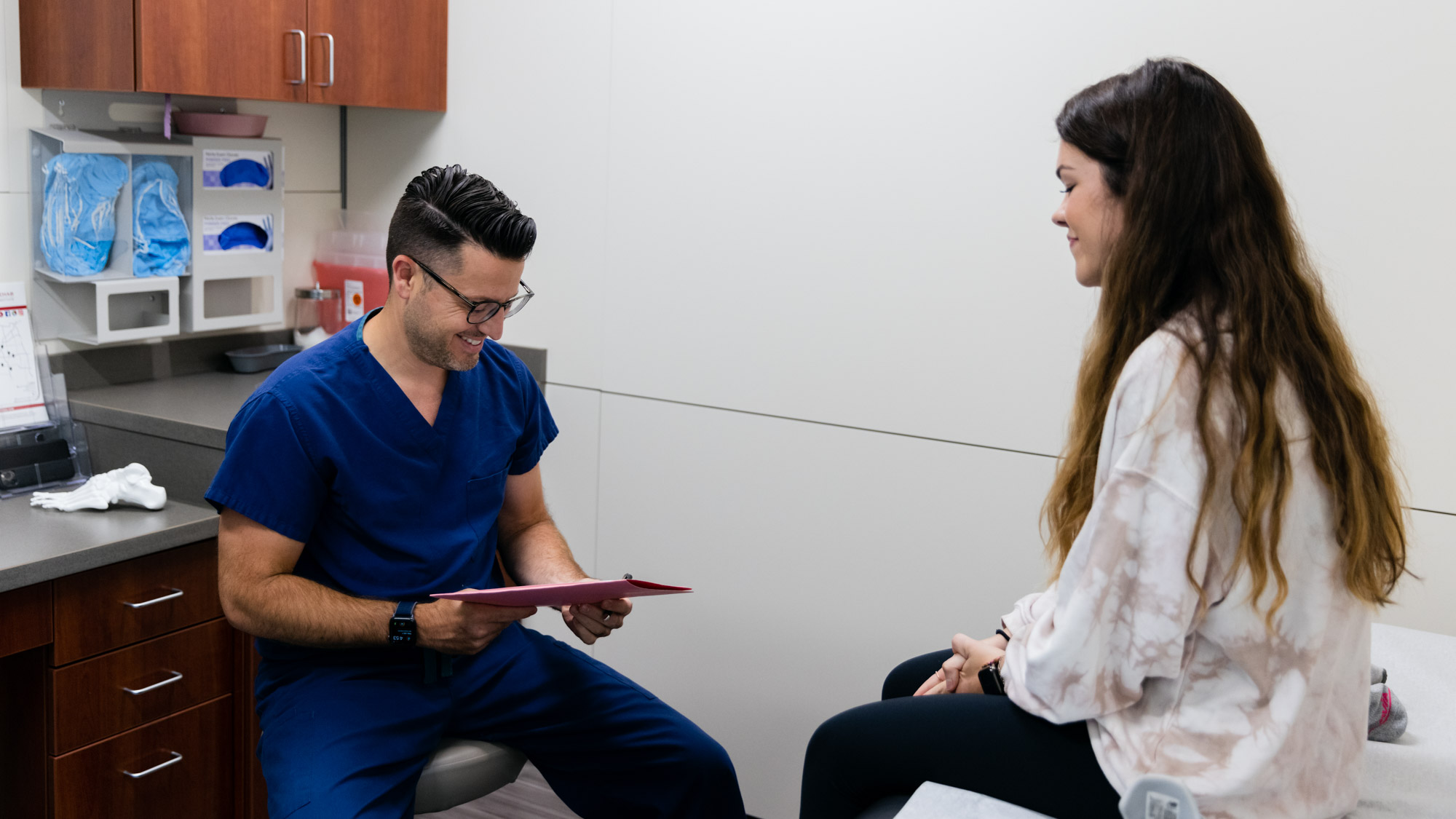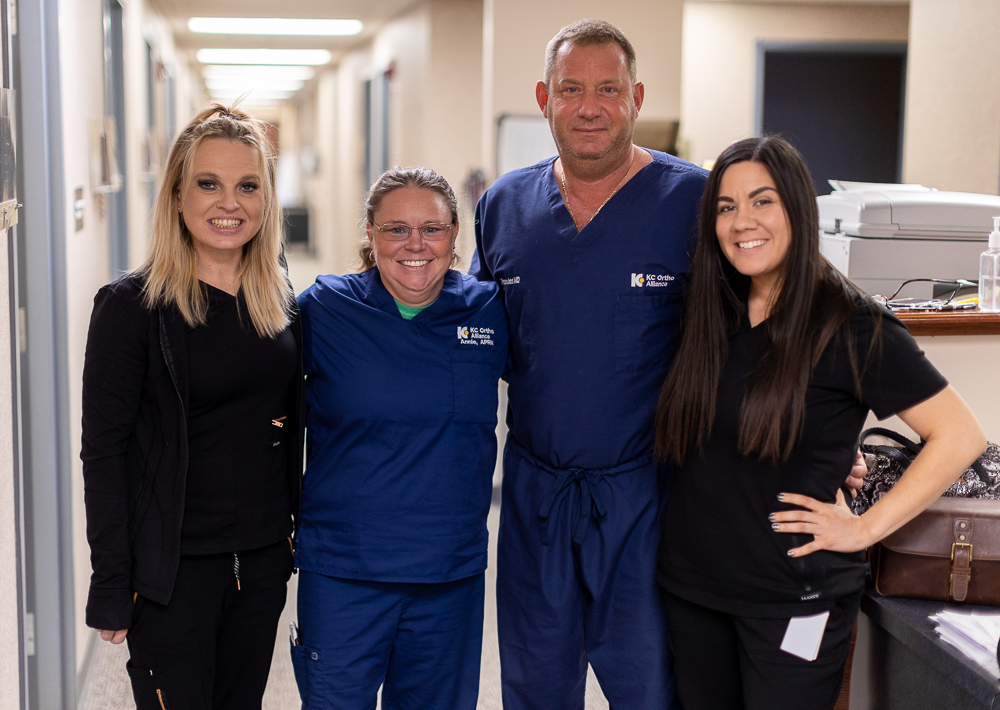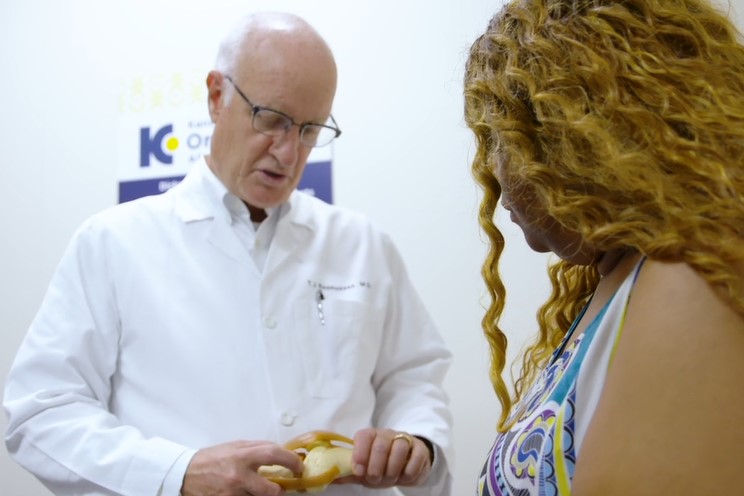
After experiencing an injury, the first step toward recovery involves choosing the right doctor for your needs. With a range of options, from orthopedic specialists and surgeons, physiatrists, and more, how do you determine the type of physician you need?
At Kansas City Orthopedic Alliance, we have a team of over 50 providers who specialize in different aspects of the musculoskeletal system. As the largest orthopedic practice in Kansas City, we treat thousands of patients each year across our 5 locations—Overland Park, Leawood, Belton, Kansas City, and Blue Springs.
Using the latest technology, our providers can evaluate, diagnose, and treat nearly any type of musculoskeletal injury. If you are experiencing pain from an injury or chronic condition, you’ve come to the right place. In this blog, we’re discussing everything you should know about physiatry in Kansas City.
What Is Physiatry?
The field of physiatry has several titles to describe its scope and focus. “Physiatry,” “physical medicine and rehabilitation, “PM&R,” and “rehabilitative medicine” are all terms used interchangeably.
Although this field has several names and subspecialties, physiatry revolves around a central goal—restoring function, treating pain, and improving a patient’s quality of life through non-surgical treatments.
Physiatry is a relatively new medical specialty that is an amalgamation of 3 well-known fields:
1. Orthopedics
Orthopedics focuses on diagnosing, treating, preventing, and rehabilitating conditions and injuries that affect the musculoskeletal system. This includes bones, joints, ligaments, tendons, muscles, and nerves that support the body and allow it to move.
2. Neurology
Neurology is a field that specializes in diagnosing and treating disorders of the nervous system. This includes the brain, spinal cord, nerves, and muscles. Neurologists commonly work with conditions such as brain disorders, spinal cord injuries, muscle disorders, and more.
3. Rheumatology
Rheumatology focuses on diagnosing and treating disorders that affect the joints, muscles, bones, and connective tissue. Rheumatologists often treat conditions such as rheumatoid arthritis, osteoarthritis, lupus, and more.
Conditions Physiatrists Treat
Physiatrists specialize in diagnosing and treating conditions of the joints, bones, muscles, and central nervous system that affect a person’s ability to function. You can think of physiatrists as non-operative musculoskeletal specialists. Some of the most common conditions physiatrists treat include:
Musculoskeletal Pain
Physiatrists treat various types of musculoskeletal pain, including back pain, neck pain, and joint pain.
Sports-Related Injuries
Physiatrists can manage the rehabilitation of common sports injuries, including ligament tears, sprains, strains, and overuse injuries.
Spinal Cord Injuries
Physiatrists help individuals suffering from spinal cord injuries improve function and adapt to life after their injury.

Traumatic Brain Injuries
Physiatrists can help patients who have experienced a traumatic brain injury restore function, motor skills, and independence.
Arthritis
Physiatrists play a role in the treatment and management of arthritis through non-surgical approaches to manage symptoms and improve function.
Neuromuscular Disorders
Physiatrists help patients with neuromuscular disorders (such as ALS, muscular dystrophy, myasthenia gravis, and more) optimize function, improve independence, and improve overall quality of life.
Treatments Physiatrists Can Offer
Physiatrists offer a wide range of treatments to restore function, manage pain, and improve patients’ quality of life. Using a holistic and collaborative approach to care, physiatry in Kansas City often involves working with other specialists to create comprehensive treatment plans that include:
Medications
In general, physiatrists don’t use medications as an end-all solution. However, medications can be necessary during the beginning stages of rehabilitation. Medications physiatrists might prescribe or recommend include:
- Nonsteroidal anti-inflammatory drugs (NSAIDS) to reduce inflammation and pain
- Muscle relaxants to alleviate muscle spasms or stiffness
- Corticosteroids to reduce inflammation and pain
- Topical analgesics to relieve pain
Rehabilitative Therapies
Physiatrists are trained to lead and coordinate care between rehabilitative therapies, including physical therapy, occupational therapy, speech-language pathology, recreation therapy, and more. A physiatrist may prescribe or recommend any combination of these therapies to improve patient function.
Interventional Procedures
Physiatrists can perform minimally invasive procedures to alleviate pain and improve function, including:
Radiofrequency Ablation
Radiofrequency ablation is a procedure that can offer patients long-lasting pain relief. The goal of radiofrequency ablation is to destroy a specific nerve’s ability to transmit pain signals to the brain.
To perform this procedure, we use a small needle and place it under a live X-ray or ultrasound. The needle goes into a specific area and releases radiofrequency waves. The radiofrequency waves heat up the needle to destroy the targeted nerve. As a result, you no longer feel pain in this area.
We can use radiofrequency ablation to treat:
- Pain in the lower back
- Knee pain
- Headaches resulting from the upper spine
We know this procedure can sound intimidating, but it is a very quick and safe treatment. However, it does take time to experience its full effects. In the days after your procedure, you will feel sore (similar to if you had a bad sunburn underneath your skin). Patients usually start feeling full pain relief 2 to 3 weeks after their procedure.
Spinal Cord Stimulation
The goal of spinal cord stimulation is to relieve chronic back pain. To understand how this procedure works, you need to know that the brain and spinal cord can only understand one type of input at a time. Spinal cord stimulation works to override the pain input with another type of input (vibration).
During the procedure, we implant a small vibrating stimulator through the epidural space (the area below the bone but above the spinal cord). This vibrates the back, tricking your brain into no longer feeling the pain input.
Before permanently implanting this device, we will do a trial period with a temporary solution to ensure that it provides adequate pain relief. If it does, we can move forward with the permanent implantation.
mild® Procedure
Minimally invasive lumbar decompression (mild) is a procedure used to treat patients with central spinal stenosis. This condition involves the narrowing of the spinal canal, putting pressure on the nerves in the lower back. The mild procedure aims to alleviate this compression and associated pain.

During the procedure, we make a small incision to remove some of the extra tissue causing compression. This procedure is best for someone who has mild to moderate central stenosis. Individuals with severe stenosis may not benefit from physiatry in Kansas City, as this would require surgery.
Verteflex Superion
Verteflex is a minimally invasive procedure used to treat mild to moderate spinal stenosis. In this condition, individuals usually have leg pain and back pain when they walk, but it resolves once they sit down.
During this procedure, we make a small incision in the lower back and place a small device between the posterior aspects of the back part of the spine. This allows the spine to open up, resolving the pain stemming from compression.
This procedure takes 20 minutes or less, and we can discharge you and send you home afterward.
Sonex
Sonex is a minimally invasive carpal tunnel release procedure. It uses ultrasound guidance and a specialized device to release the transverse carpal ligament to alleviate pressure on the median nerve.
This procedure requires small incisions and minimizes trauma to the surrounding tissues. It is the most minimally invasive way to perform a carpal tunnel release surgery. One of the greatest benefits of this procedure is that the recovery time is short, and you don’t have to limit your activities after the procedure.
Ultrasound Guided Injections
Ultrasound technology allows physiatrists to visualize internal structures in real time while administering therapeutic injections. Injections can be used throughout the body to relieve pain associated with various musculoskeletal conditions, including arthritis, tendonitis, bursitis, and more.
Ultrasound-guided injections allow for a more precise delivery of medication to the treatment area. This enhances the effectiveness of the injections and also reduces the risk of unintended tissue damage.
Tenex
Tenex is an advanced, minimally invasive procedure used to treat chronic tendon pain. The procedure uses ultrasonic technology to break up and remove damaged or diseased tissue from the tendons.
A physical medicine specialist in Kansas City can use Tenex to treat various tendon conditions, including:
- Plantar fasciitis
- Tennis elbow
- Rotator cuff tendonitis
- Achilles tendonitis
- Patellar tendonitis
- Hip tendonitis
- Bicep tendonitis
Orthobiologic Injections
Orthobiologic injections include platelet-rich plasma (PRP) injections and bone marrow aspirate concentrate, or “stem cell” injections. During orthobiologic treatments, we take a substance from your body, concentrate it down to the most important factors, and then inject it back into the body.
This optimizes the body’s own ability to heal the area causing you pain. Orthobiologic injections need to be in precise contact with the target area, so we use ultrasound guidance to achieve the best results.
Orthobiologic injections are a helpful way to relieve pain and improve function for various conditions, including osteoarthritis and tendinopathies.
Visit KCOA for Physiatry in Kansas City
At Kansas City Orthopedic Alliance, we’re dedicated to creating a superior patient experience for all. If you’re wondering what to do about pain, KCOA has a PM&R specialist near you.

We’ve helped thousands of patients treat their pain, restore their function, and improve their quality of life.
For a thorough evaluation, call us at (913) 319-7600 or schedule an appointment today. If you’re struggling with pain but don’t know where to start, use our symptom tracker for treatment recommendations.


